"The A to Z of Genesis" - Tony Banks continues his discussion of his career
in the band. Interview by Alan, Peter and Jonathan.
Continuing our conversation with Tony about his time with the band, we come
to the Abacab and Genesis albums...
TWR: First of all, Tony, what did "Abacab" actually mean?
TB: It meant nothing really, it was just a possible
order for the bits of the song "Abacab": A B C A B as it happens that's
how it ended up we changed it all around again and it was totally unpronounceable
and again it was the idea of a totally abstract word that meant nothing
at all, and was in the lyric to that song. We thought, why not tie it
in with an abstract cover in keeping with the changes that we had consciously
made in order to get away from the compulsory keyboard solo, the tambourine
on the chorus and all that sort of "wet" sound if you like (laughter),
and just go for a different approach, with this very dry sort of thing,
very streamlined. We were very pleased with the result and so this album,
the cover and everything was crucial, and I know that many people didn't
like it, but for us it was crucial and I don't think that the band could
have carried on. We couldn't have done... if we had done another album
like "Duke", another album in the old tradition, I don't think we would
have made it. That would have been it and we had to make the change
and it gave us something different to do, and of course, Phil was obviously
becoming more confident as a writer and that meant that there was more
of a shift, a change in emphasis slightly with the three of us back together
writing and we were producing a band effect.
I listened to that album recently and one of my favourite tracks was
the one that everybody hates: "WhoDunnit?" (laughter), I thought that's
a great track, why didn't we do more like that? I remember playing that
and trying to get this sort of computer noise and Mike and Phil were listening
and they thought, "you've got something there..." So, we put it down on
tape with this drum music that Phil was playing and we improvised on it
for thirty minutes, and there is a thirty minute version of the song for
people who really like the song (laughter), and we cut it down
and it was a great result. I liked it because it was very extreme, an
I am a kind of perverse kind of person, and I like to explore different
areas.
Some of the other songs don't quite match that and I think it is great,
and we used to get booed when we played when we played it! We played Leiden
in Holland and we got booed and so we went back there and we played there
again. There was this reaction against songs like that and "Man On The
Corner" because it was simple and that was seen as being wrong and yet
that has always been a part of Genesis and there is this illusion that
it has taken over and I don't think it has taken over at all, there is
just a little more emphasis and we do it better than we used to and therefore
it gets a much higher profile, because the singles are actually hits.
It has always been there and it used to be things like "For Absent Friends".
TWR: Was it the first album to be recorded here, at The Farm?
|
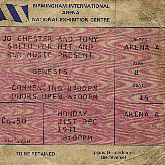

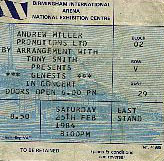 Tickets for Genesis shows
Tickets for Genesis shows
from 1981, 1982, 1983 |
TB: Yes, it was although the control room was over there, we put this
bit on afterwards. The idea was just to keep it as simple as we could but then
we decided to use more technology and that was when all this stuff came in!
It was fun to actually be in the room and we rehearsed over in the house because
this bit wasn't finished yet but to be in our own place where we didn't have
to worry about time was quite fun, and actually I think we definitely tried
out simpler ideas and see where they would lead, some of which may have been
more successful than others. I go for the more quirky things like "Keep It Dark"
which are kind of odd songs than I am about things like "No Reply At All" which
is a more straightforward kind of song. But these were all the sort of things
we wanted to try and see what it was like from our own point of view and some
people loved the album and some people hated it... the people on the road crew
hated it! (laughs) but it was a necessary thing. I always said to people then,
and I still do now... "if you like the more flowery stuff, then it is still
there, go and listen to it...There are half a dozen albums before that one to
listen to and we can't put on a pair of old shoes that no longer fit..."
TWR: You seem to have had rather a lot of tracks left over...?
TB: Well, again we had three tracks leftover which we decided not
to include, "Me & Virgil", which was a sort of band type song. "Naminanu" was
quite fun and "Submarine" which was an instrumental thing of mine.
TWR: Moving on to "Genesis". "Home By The Sea" was seen by many as
being a return to the traditional Genesis "long" track...?
TB: Well it was a traditional thing, but with a different approach
and if you are talking about the second half rather than the first half, we
were just out there improvising and Phil was just playing in three and Mike
and I were just playing over the top of that and all of the little moments coalesced
and it sounded fantastic and we just played to see what would happen and we
pulled some moments which were great and so we came in here and we had two thirty
minute tapes of it. Mike and I just sat down and marked the best bits... the
things we thought were good. We learned exactly what we played and if we changed
the chord on the third beat of the bar, we did it and I did exactly the notes
I did on his things and then we just stuck it all together and one bit that
sounded good we played twice, and it just came out like that.
Once again we just experimented really in the studio, but it was a really
good improvisation we had done and all we had to do was organise the improvisation
and there was that, and of course, "Mama" which was the other thing that was
on the album because we had the studio and we had this little germ of an idea
and Mike was playing something through a fuzzbox or something like that and
we thought, don't worry about that, it sounded so good on its own and the drum
box sounded so good and I put a drone on it somewhere and some sound on it and
we had the skeletal idea and we put it down and we could do that in the studio
which we couldn't really have done without a studio of our own, and once again
we tried not to do too much, very simple chords and try out this sort of laugh.
It was just a sort of joke and it sounded so good we had to put it somewhere
and it soon became a feature of the song. I love moments like that, where it
is not even written. The trick is to hear something that's any good. It is not
difficult, anybody can do it but it helps if you have the machines to help you
get a result...
And there you have it for another issue. Our thanks again, to Tony for
putting up with us once again and to Peter Gozzard, David Hussey and Judith
Mitchell for the use of the press cuttings included in this feature. Next time
we focus on the band's Invisible Touch and We Can't Dance albums...
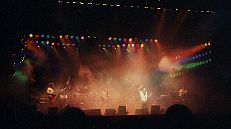
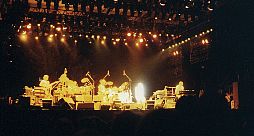
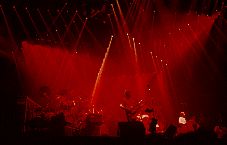
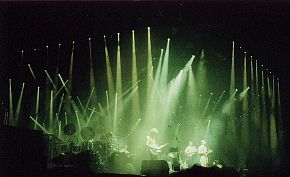
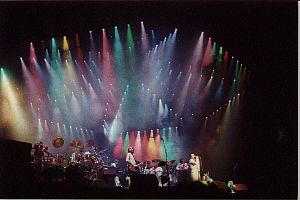
|
Genesis on stage in the early 80s
Picture
courtesy of M Ainscoe/A Banks/TWR |







